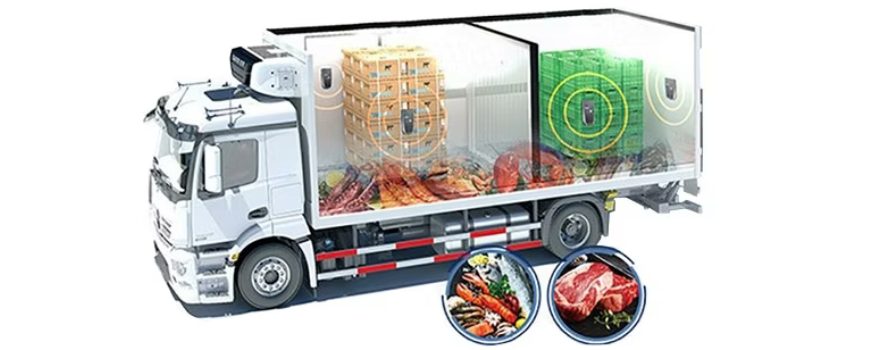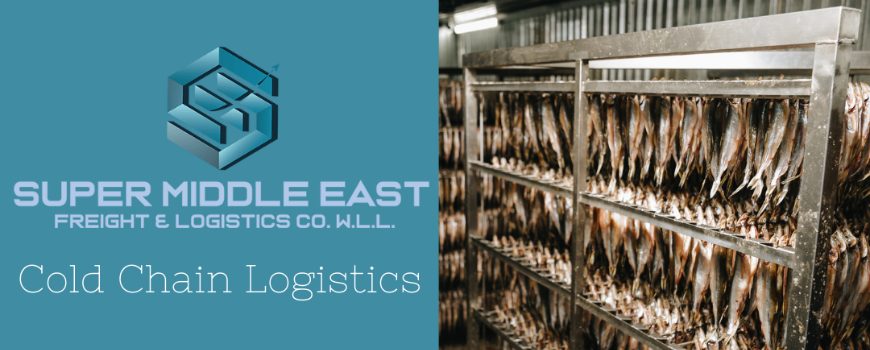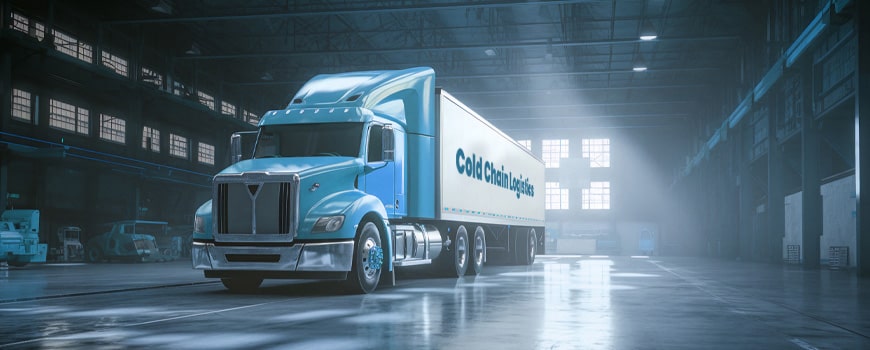What is Cold Chain Logistics | Maximizing Efficiency and Minimizing Loss
Cold chain logistics is important in ensuring the safe and efficient transportation of temperature-sensitive goods like ice cream, meat, and chemicals. In simple words, it involves the management of temperature-controlled environments, from the point of origin to the final destination. This attentive process prevents spoilage, maintains quality, and extends product life. However, cold chain transportation is essential for industries such as pharmaceuticals, food and beverage, and biotechnology.

To understand the significance of this type of logistics, it is important to grasp the concept of temperature-controlled supply chains. These chains are designed to maintain specific temperature ranges for perishable goods, ensuring their integrity throughout the entire journey. By controlling the temperature and humidity levels, temperature controlled logistics minimize the risk of spoilage, contamination, and degradation as well. Ready to explore more about efficient logistics solutions? Check out the other article on “Express Delivery,” the ultimate solution for time-sensitive shipments and customer satisfaction.
Components of Cold Chain Logistics
Cold chain logistics involves several key components that work together to ensure the safe and efficient transportation of temperature-sensitive goods.
- Temperature Monitoring: Accurate and real-time temperature monitoring is vital in cold chain logistics. This is achieved through the use of temperature sensors and data loggers, which provide valuable insights into the conditions experienced by the goods during transit. However, by monitoring temperature fluctuations, any deviations can be quickly identified and rectified, minimizing the risk of product loss.
- Packaging and Insulation: Additionally, proper packaging and insulation are essential to maintain the required temperature range for perishable goods. Insulated containers, refrigerated trucks, and temperature-controlled warehouses help preserve the quality and integrity of the products. Furthermore, the use of specialized packaging materials, such as thermal blankets and cooling gels, further prevents temperature fluctuations.
- Transportation and Distribution: Cold chain logistics heavily relies on the transportation and distribution of goods in temperature-controlled vehicles. Refrigerated trucks, reefers, and air cargo containers for air freight ensure the products remain within the desired temperature range during transit. However, efficient route planning is also crucial to minimize transit times and reduce the risk of exposure to unfavorable conditions.
Challenges in Cold Chain Logistics
Despite its importance, cold chain shipping faces numerous challenges that can impact the efficiency and integrity of the temperature-sensitive goods being transported.
First and foremost, maintaining a consistent temperature throughout the supply chain is a significant challenge. External factors, such as weather conditions, power outages, and delays can lead to temperature fluctuations. These fluctuations can compromise the quality and safety of the goods, resulting in spoilage, reduced shelf life, and potential health hazards.

Moreover, cold chain supply management involves multiple stakeholders, including suppliers, manufacturers, distributors, and retailers. Coordinating the activities of these stakeholders, ensuring timely deliveries, and maintaining quality standards can be complex. However, effective communication and collaboration are essential to overcome logistical challenges and ensure a seamless flow of goods. Lastly, the transportation of temperature-sensitive goods is subject to strict regulations and guidelines, particularly in the pharmaceutical and food industries. Compliance with these regulations is crucial to ensure product safety and integrity. Anyway, failure to meet regulatory requirements can result in severe penalties, legal issues, and damage to brand reputation.
Best Practices for Minimizing Loss
To maximize efficiency and minimize loss in cold chain logistics, certain best practices should be followed.
- Implement Robust Quality Management Systems: Establishing a robust quality management system is essential to ensure that all processes and procedures comply with industry standards and regulatory requirements. This system should include regular audits, risk assessments, and continuous improvement initiatives to identify and mitigate potential risks.
- Invest in Reliable Temperature Monitoring Technology: Utilize advanced temperature monitoring technology to accurately track and record temperature data throughout the supply chain. This includes the use of wireless sensors from HC online store, cloud-based data storage, and real-time alerts. However, by having accurate and timely information, proactive measures can be taken to rectify any deviations and prevent product loss.
- Train and Educate Personnel: Additionally, proper training and education of personnel involved in cold chain management are crucial. This ensures that everyone understands the importance of maintaining temperature control, follows standard operating procedures, and knows how to handle temperature-sensitive goods. Whatever, regular training sessions and workshops can help reinforce best practices and keep employees up-to-date with the latest industry advancements.
Conclusion
Cold chain logistics is a critical component of various industries, ensuring the safe and efficient transportation of temperature-sensitive goods. Implementing robust quality management systems, investing in reliable temperature monitoring technology, and providing adequate training to personnel maximize the efficiency of cold chain logistics while minimizing product loss. Despite that, all stakeholders involved in the cold chain need to collaborate and adhere to regulatory requirements to maintain the integrity and quality of temperature-sensitive goods. If you are looking for reliable freight & logistics services in the Middle East, Super Middle East Freight & Logistics is your trusted partner. With our expertise in transportation and distribution, we can help you navigate the complexities of logistics and ensure the safe delivery of your goods.


